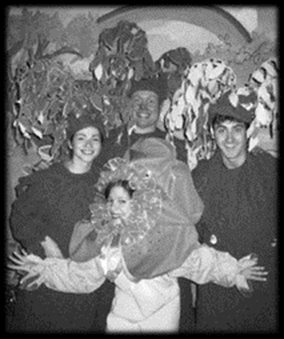New York Magazine - Praise for "Dolphin up a Tree!"
” In a Dolphin up a Tree!, a girl casts a spell to make her stuffed animal collection come to life. The bad news is that she turns herself into a dolphin, finding herself like a fish out of water…”
“In this musical comedy by the talented Kimberly Foster, the animals learn to work together to solve this not-so-grounded situation. Foster’s brilliance is in the subtle appropriation of the psychologically based theories of personality types and multiple intelligences to tell the story.”
New York Times - Praise for "Dolphin up a Tree!" "The Big Stew" and "Happy Flower and Weeping Willow."
“Much more fun than the purple dinosaur…”
“Kimberly Foster is an old hand at making the vegetable kingdom seem exciting…”
“… delightful for 3‐ to 8‐year‐olds, for whom this 40‐minute tale is ideal.
The children are called on to do things they’re experts at: laughing and crying. The show also has wry humor for adults, including a rude French tree and a hilarious moment when Grandmother echoes a line from “Jerry Maguire.”
Joshua Sitron (composer of “Dora The Explorer”) wrote the amusing score.
“Happy Flower” plays in tandem with “Dolphin Up a Tree”, another Foster
show about making the inanimate animate: stuffed animals.”



The Big Stew To the Core - Organic veggies at the root of conflict
New York Magazine - by Susan Avery
While parents continue to twist themselves up about going organic or not, kids can now get taste of the issue with this weekend’s return of The Big Stew. This musical fairy tale, now onstage in Chelsea at the Atlantic Theater Company, pits a Mean Green Grocer and his perfectly red irradiated tomato against the latter’s chemical‐free produce cousins, seducing vegetables into the world of longer shelf lives with compliments on their looks. Playwright Kimberly Foster, a strict organic eater herself, used the veggie tale more as metaphor to teach kids to appreciate their natural selves rather than engage them in a debate about food purity.To Foster’s surprise, when the show was first performed in 2002 (with Jason Ritter as the villain), teachers were quick to use the story as the lead‐in to a science lesson. Foster, a preschool teacher herself, drew on her career acquired knowledge of the Myers‐Briggs theory of personality types and Howard Gardner’s theory of multiple intelligences when she wrote her first show and book, A Dolphin Up a Tree, which may now be headed for a TV‐series deal.With Stew, Foster says she’ll keep using nonhuman characters to convey all manner of human acceptance. “Life is so much easier when you look at people from a Myers‐Briggs point of view,” she says.
